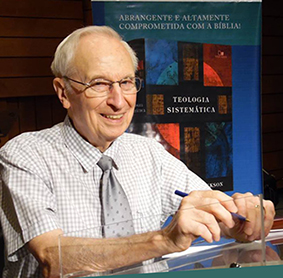 In his chapter on the work of the Holy Spirit Erickson surveys the work of the Spirit in the Old Testament and in the life of Jesus, before turning to the work of the Spirit with respect to the commencement and continuation of Christian life. In the Old Testament the work of the Spirit is predominantly understood in terms of the Spirit’s anointing whether for leadership, service or prophecy, and as a sanctifying presence producing the moral and spiritual qualities of holiness and goodness in the lives of those upon whom his presence comes. This work continues in the Christian experience of new covenant believers where the key aspects of the Spirit’s work include illumination, sanctification and empowering. Erickson concludes the chapter with an unconvincing and somewhat ambivalent discussion of the contemporary manifestation of the miraculous gifts.
In his chapter on the work of the Holy Spirit Erickson surveys the work of the Spirit in the Old Testament and in the life of Jesus, before turning to the work of the Spirit with respect to the commencement and continuation of Christian life. In the Old Testament the work of the Spirit is predominantly understood in terms of the Spirit’s anointing whether for leadership, service or prophecy, and as a sanctifying presence producing the moral and spiritual qualities of holiness and goodness in the lives of those upon whom his presence comes. This work continues in the Christian experience of new covenant believers where the key aspects of the Spirit’s work include illumination, sanctification and empowering. Erickson concludes the chapter with an unconvincing and somewhat ambivalent discussion of the contemporary manifestation of the miraculous gifts.
In my judgment it is not possible to determine with any certainty whether the contemporary charismatic phenomena are indeed gifts of the Holy Spirit. … What we must do, then, is to evaluate each case on its own merits (801).
Erickson’s cautious approach to the topic is not inappropriate though it does require the work of the Spirit to exhibit a degree of rationality and proof that seems unwarranted. Because the kinds of religious phenomena associated with charismatic spirituality can also be explained by appeal to psychological or even demonic causation, caution is in order; nevertheless,
No conclusive case can be made for the contention that such gifts are not for today and cannot occur at the present time….In fact, it may be downright dangerous, in light of Jesus’s warning regarding blasphemy against the Holy Spirit, to attribute specific phenomena to demonic activity (802).
Nevertheless Erickson immediately continues,
In the final analysis, whether the Bible teaches that the Spirit dispenses special gifts today is not an issue of great practical consequence. For even if he does, we are not to set our lives to seeking them. He bestows them sovereignly; he alone determines the recipients (1 Cor. 12:11). If he chooses to give us a special gift, he will do so regardless of whether we expect it or seek it (802).
I find this statement to be quite unlike Erickson and assume that he can make it only by granting his experience priority over the biblical testimony which he is so scrupulous to follow elsewhere. I cannot imagine him using this rationale with respect to conversion or the preaching of the gospel. No, indeed! Erickson will passionately and persuasively exhort people to believe, to preach the gospel, etc. Paul, of course, does tell the church to earnestly desire spiritual gifts and especially that they might prophesy (1 Cor. 14:1, 39). He exhorts them to seek to excel in the building up of the church for it is precisely for this reason that the Spirit gives the gifts (1 Cor. 14:12; cf. 12:7).
If the Spirit intends that every believer experience his manifestation for the benefit of all, then surely it is something we should prayerfully, humbly and diligently expect and seek. Might it be that we do not experience as much of the manifestation of the Spirit as we might wish precisely because we do not prayerfully expect or seek his presence and activity?
